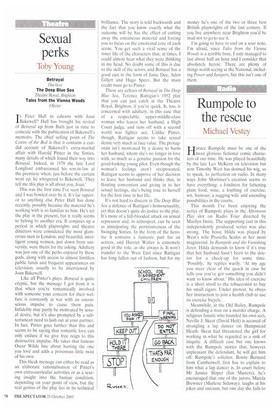Sexual perks
Toby Young
Betrayal Duchess The Deep Blue Sea Theatre Royal. Brighton Tales from the Vienna Woods Olivier
Is Peter Hall in cahoots with Joan Bakewell? Hall has brought his revival of Betrayal up from Bath just in time to coincide with the publication of Bakewell's memoirs. The chief selling point of The Centre of the Bed is that it contains a candid account of Bakewell's extra-marital affair with Harold Pinter in the Sixties, many details of which found their way into Betrayal. Indeed, in 1978 the late Lord Longford embarrassed his son-in-law at the premiere when, just before the curtain went up, he whispered to Bakewell, 'They tell me this play is all about you, Joan.'
This was the first time I've seen Betrayal and I was bowled over by it. It's far superior to anything else Peter Hall has done recently, possibly because the material he's working with is so familiar to him. He's set the play in the present, but it really seems to belong to another era. It conjures up a period in which playwrights and theatre directors were considered the most glamorous men in London, and beautiful, intelligent young women, just down from university, were theirs for the asking. Adultery was just one of the perks enjoyed by these gods, along with access to almost limitless public funds and frequent appearances on television, usually to be interviewed by Joan Bakewell.
Like all Pinter's plays. Betrayal is quite cryptic, but the message I got from it is that when you're romantically involved with someone your concern for their welfare is constantly at war with an unconscious impulse to cause them pain. Infidelity may partly be motivated by sexual desire, but it's also prompted by a subterranean need to lash out at your partner. In fact, Pinter goes further than this and seems to be saying that romantic love can only endure if we give free reign to this destructive impulse. He takes that famous Oscar Wilde line about hurting the one you love and adds a poisonous little twist of his own.
This bleak message can either be read as an elaborate rationalisation of Pinter's own extra-curricular activities or as a searing insight into the human condition, depending on your point of view, but the real genius of the play lies in its technical brilliance. The story is told backwards and the fact that you know exactly what the outcome will be has the effect of cutting away the extraneous material and forcing you to focus on the emotional core of each scene. You get such a vivid sense of the inner life of the characters that, at times. I could almost hear what they were thinking in my head. No doubt some of this is due to the skill of the actors, and Betrayal has a good cast in the form of Janie Dee, Aden Gillett and Hugo Speer. But the main credit must go to Pinter.
There are echoes of Betrayal in The Deep Blue Sea, Terence Rattigan's 1952 play that you can just catch at the Theatre Royal, Brighton, if you're quick. It, too, is concerned with adultery, in this case that of a respectable, upper-middle-class woman who leaves her husband, a High Court judge, and runs off with a second world war fighter ace. Unlike Pinter, though, Rattigan seems to take sexual desire very much at face value. The protagonist isn't motivated by a desire to harm her husband, whom she's no longer in love with, so much as a genuine passion for the good-looking young pilot. Even though the woman's feelings aren't reciprocated, Rattigan seems to approve of her decision to leave her husband and thinks that, in flouting convention and giving in to her sexual feelings, she's being true to herself for the first time in her life.
It's not hard to discern in The Deep Blue Sea a defence of Rattigan's homosexuality, yet that doesn't quite do justice to the play. It's more of a full-blooded attack on sexual repression and, in retrospect, can be seen as anticipating the permissiveness of the Swinging Sixties. In the form of the heroine it contains a fantastic part for an actress, and Harriet Walter is extremely good in the role, as she always is. It won't transfer to the West End since Rattigan has long fallen out of fashion, but for my money he's one of the two or three best British playwrights of the last century. If you live anywhere near Brighton you'd be mad not to go to see it.
I'm going to have to end on a sour note. I'm afraid, since Tales from the Vienna Woods is a terrible bore. I only managed to last about half an hour and I consider that absolutely heroic. There are plenty of things worth seeing at the National, including Power and Jumpers, but this isn't one of them.


































































































 Previous page
Previous page